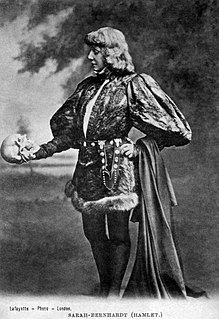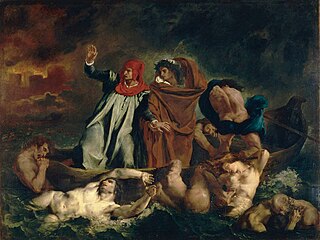Related Research Articles

Classics or classical studies is the study of classical antiquity. In the Western world, classics traditionally refers to the study of Classical Greek and Roman literature and their related original languages, Ancient Greek and Latin. Classics also includes Greco-Roman philosophy, history, archaeology, anthropology, art, mythology and society as secondary subjects.
The classical unities, Aristotelian unities, or three unities represent a prescriptive theory of dramatic tragedy that was introduced in Italy in the 16th century and was influential for three centuries. The three unities are:
- unity of action: a tragedy should have one principal action.
- unity of time: the action in a tragedy should occur over a period of no more than 24 hours.
- unity of place: a tragedy should exist in a single physical location.
Greek literature dates back from the ancient Greek literature, beginning in 800 BC, to the modern Greek literature of today.

Tragedy is a genre of drama based on human suffering and, mainly, the terrible or sorrowful events that befall a main character. Traditionally, the intention of tragedy is to invoke an accompanying catharsis, or a "pain [that] awakens pleasure", for the audience. While many cultures have developed forms that provoke this paradoxical response, the term tragedy often refers to a specific tradition of drama that has played a unique and important role historically in the self-definition of Western civilization. That tradition has been multiple and discontinuous, yet the term has often been used to invoke a powerful effect of cultural identity and historical continuity—"the Greeks and the Elizabethans, in one cultural form; Hellenes and Christians, in a common activity," as Raymond Williams puts it.
Publius Cornelius Dolabella was a Roman politician and general under the dictator Julius Caesar. He was by far the most important of the patrician Cornelii Dolabellae but he arranged for himself to be adopted into the plebeian Cornelii Lentuli so that he could become a plebeian tribune. He married Cicero's daughter, Tullia, although he frequently engaged in extramarital affairs. Throughout his life he was an extreme profligate, something that Plutarch wrote reflected ill upon his patron Julius Caesar.

In Greek mythology, Kratos is the divine personification of strength. He is the son of Pallas and Styx. Kratos and his siblings Nike ('Victory'), Bia ('Force'), and Zelus ('Glory') are all essentially personifications of a trait. Kratos is first mentioned alongside his siblings in Hesiod's Theogony. According to Hesiod, Kratos and his siblings dwell with Zeus because their mother Styx came to him first to request a position in his regime, so he honored her and her children with exalted positions. Kratos and his sister Bia are best known for their appearance in the opening scene of Aeschylus' Prometheus Bound. Acting as agents of Zeus, they lead the captive Titan Prometheus on stage. Kratos compels the mild-mannered blacksmith god Hephaestus to chain Prometheus to a rock as punishment for his theft of fire.

Classicism, in the arts, refers generally to a high regard for a classical period, classical antiquity in the Western tradition, as setting standards for taste which the classicists seek to emulate. In its purest form, classicism is an aesthetic attitude dependent on principles based in the culture, art and literature of ancient Greece and Rome, with the emphasis on form, simplicity, proportion, clarity of structure, perfection, restrained emotion, as well as explicit appeal to the intellect. The art of classicism typically seeks to be formal and restrained: of the Discobolus Sir Kenneth Clark observed, "if we object to his restraint and compression we are simply objecting to the classicism of classic art. A violent emphasis or a sudden acceleration of rhythmic movement would have destroyed those qualities of balance and completeness through which it retained until the present century its position of authority in the restricted repertoire of visual images." Classicism, as Clark noted, implies a canon of widely accepted ideal forms, whether in the Western canon that he was examining in The Nude (1956), or the literary Chinese classics or Chinese art, where the revival of classic styles is also a recurring feature.

Tragicomedy is a literary genre that blends aspects of both tragic and comic forms. Most often seen in dramatic literature, the term can describe either a tragic play which contains enough comic elements to lighten the overall mood or a serious play with a happy ending. Tragicomedy, as its name implies, invokes the intended response of both the tragedy and the comedy in the audience, the former being a genre based on human suffering that invokes an accompanying catharsis and the latter being a genre intended to be humorous or amusing by inducing laughter.

A Greek chorus, or simply chorus, in the context of ancient Greek tragedy, comedy, satyr plays, and modern works inspired by them, is a homogeneous, non-individualised group of performers, who comment with a collective voice on the dramatic action. The chorus consisted of between 12 and 50 players, who variously danced, sang or spoke their lines in unison, and sometimes wore masks.

Classical mythology, Greco-Roman mythology, or Greek and Roman mythology is both the body of and the study of myths from the ancient Greeks and ancient Romans as they are used or transformed by cultural reception. Along with philosophy and political thought, mythology represents one of the major survivals of classical antiquity throughout later Western culture. The Greek word mythos refers to the spoken word or speech, but it also denotes a tale, story or narrative.
A prologue or prolog is an opening to a story that establishes the context and gives background details, often some earlier story that ties into the main one, and other miscellaneous information. The Ancient Greek prólogos included the modern meaning of prologue, but was of wider significance, more like the meaning of preface. The importance, therefore, of the prologue in Greek drama was very great; it sometimes almost took the place of a romance, to which, or to an episode in which, the play itself succeeded.
Peter Meineck is Professor of Classics in the Modern World at New York University. He is also the founder and humanities program director of Aquila Theatre and has held appointments at Princeton University and University of South Carolina.

Drama is the specific mode of fiction represented in performance: a play, opera, mime, ballet, etc., performed in a theatre, or on radio or television. Considered as a genre of poetry in general, the dramatic mode has been contrasted with the epic and the lyrical modes ever since Aristotle's Poetics —the earliest work of dramatic theory.

Theatre or theater is a collaborative form of performing art that uses live performers, usually actors or actresses, to present the experience of a real or imagined event before a live audience in a specific place, often a stage. The performers may communicate this experience to the audience through combinations of gesture, speech, song, music, and dance. Elements of art, such as painted scenery and stagecraft such as lighting are used to enhance the physicality, presence and immediacy of the experience. The specific place of the performance is also named by the word "theatre" as derived from the Ancient Greek θέατρον, itself from θεάομαι.

A major branch of classical mythology, Greek mythology is the body of myths originally told by the ancient Greeks, and a genre of Ancient Greek folklore. These stories concern the origin and nature of the world, the lives and activities of deities, heroes, and mythological creatures, and the origins and significance of the ancient Greeks' own cult and ritual practices. Modern scholars study the myths to shed light on the religious and political institutions of ancient Greece, and to better understand the nature of myth-making itself.

The Western classical tradition is the reception of classical Greco-Roman antiquity by later cultures, especially the post-classical West, involving texts, imagery, objects, ideas, institutions, monuments, architecture, cultural artifacts, rituals, practices, and sayings. Philosophy, political thought, and mythology are three major examples of how classical culture survives and continues to have influence. The West is one of a number of world cultures regarded as having a classical tradition, including the Indian, Chinese, and Islamic traditions.
Helene P. Foley is an American classical scholar. She is Professor of Classical Studies at Barnard College, Columbia University and a member of the Institute for Research on Women, Gender and Sexuality at Columbia. She specialises in ancient Greek literature, women and gender in antiquity, and the reception of classical drama.

Nancy Sorkin Rabinowitz is a classical scholar, specialising in ancient Greek literature and intersectional feminism.
Suzanne Dixon is an Australian classical scholar, widely recognised as an authority on women's history and particularly marriage and motherhood.

Rebecca Futo Kennedy is Associate Professor of Classics, Women's and Gender Studies, and Environmental Studies at Denison University, and the Director of the Denison Museum. Her research focuses on the political, social, and cultural history of Classical Athens, Athenian tragedy, ancient immigration, ancient theories of race and ethnicity, and the reception of those theories in modern race science.
References
- ↑ Kennard, Joseph Spencer (1964). The Italian Theatre: From its beginning to the close of the seventeenth century . B. Blom. pp. 146.
- ↑ van Zyl Smit, Betine (2016). A Handbook to the Reception of Greek Drama. Wiley Blackwell Handbooks to Classical Reception. John Wiley & Sons. ISBN 9781118347768.
- ↑ Di Maria, Salvatore (2002). The Italian Tragedy in the Renaissance: Cultural Realities and Theatrical Innovations. Bucknell University Press. p. 42. ISBN 9780838754900.